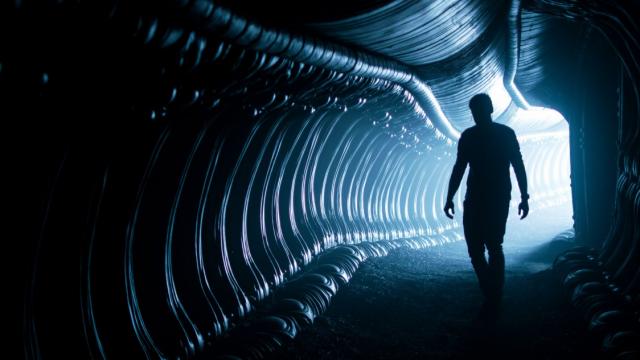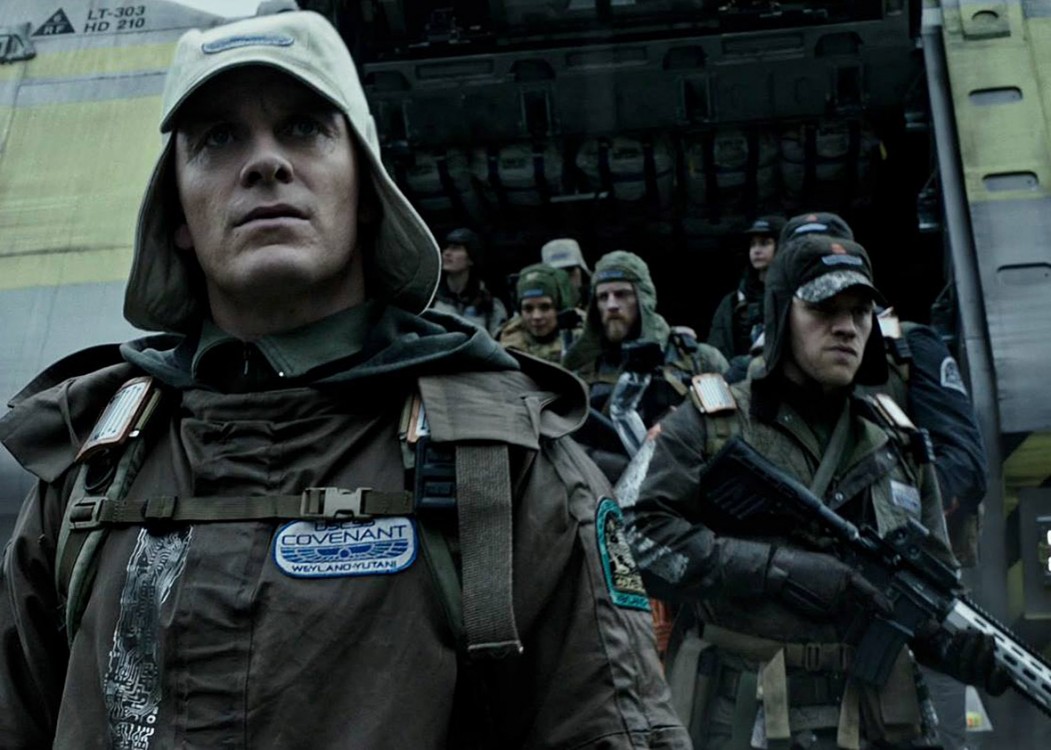
"Alien: Covenant" begins in a place awfully reminiscent of how its predecessor, the classic (and original) "Alien," began. A familiar score plays over a shot of a ship floating in space, with letters slowly appearing out of order before forming the main title. From here we are thrust into terror, like awakening from a pleasant dream only to live in a fiery nightmare. This is director Ridley Scott’s current and former vision of space travel, never mincing atmospherics or frights. For him, there is no comfort in the unknown, and any potential glory can only be the result of safe choices. However, as we have seen and will continue to see in the Alien series, safe choices are in short supply.
"Covenant" finds a colonization crew exploring a planet from which a distress beacon came. What they discover is not someONE, but rather someTHINGS, and end up with plenty a dead body to count. The decision here to not investigate – which I’ll call ignorance – would have been wise, and perhaps blissful by comparison. Then again, we would have been left with a more boring film. But when I think about "Covenant," I am reminded most of the current vitriol in Democrat v. Republican politics, and how that rage has affected civilian life.
This particular space crew shares a singular mission and handles all problems with roundtable-like conversation. However, respect isn’t always reciprocated, and people's thoughts on faith are often seen more as a weakness or liability than anything else. As far advanced as this culture’s technology has become, it all boils down to the human factor and how we deal with each other. "Covenant" may not be a zombie film where the “real” monsters are the living, but as far as the movie depicts it, our modern and their future efforts in democracy need some fine-tuning and, better yet, proper direction.
Continuing from Prometheus, we are blessed by actor Michael Fassbender’s return in the role of David, a humanoid android from the now faceless corporation that funds nearly all of the missions in these stories. Stranded on the former homeworld of those that “engineered” life on Earth, David suffers from loneliness and uncertainty of his place in the universe, especially within the parameters that he was made. In a memory, he recalls meeting his maker – the head corporate guru that kickstarted everything -– who states creepily and matter of factly how he has just accomplished something the man may never: He is looking upon his “God” without a doubt.
In more ways than one, Fassbender aces his role, both in performance and in what he represents to the crew that finds him. Not to spoil, but the knowledge of his existence is an obstacle that must be overcome – for the crew, for faith, for humanity. At large, these humans have developed great vehicles for travel and assistive robotic technology for help, but as "Covenant" demonstrates, the search for more has not lead to answers within.
It’s surprising how the opportunity to expand our species to the far reaches of the galaxy – implying great economic standing (or desperation) on Earth, in order to accomplish such an immense task – remains as anxiety-filled as it is today. Androids fulfilling our basic functions while we sleep, medical science that has improved life expectancy and entities with enough resources to finance such projects – this world better have universal health care AND universal basic income for all. Of course, thousands of unseen characters have joined Covenant’s colony, so maybe there is a rush to leave.
Within all of us is, I believe, a willingness and need to help others. This is examined and exposed in the movie, but not really stated in mythology. One would suspect that Earth has taken on less of a "Star Trek" role and more of a "Back to the Future: Part II" privatization step backwards. Comfort and convenience over justice and what’s right, it seems. The potential for good is here, right in front of them and in front of us. Why does it remain unseen? Why let the exploitation occur? They’ve lost, but do we have to?
Almost every Alien movie features a subplot involving corporate conspiracy about the monsters. Experimentation? Weaponization? The risk of life is overshadowed by the possibility for profit. It’s embedded in the series, but never too forefront in any one story. It was Prometheus that laid out the notion that the original intent of these missions was based on naivete, not greed. Extrapolated, this could be said clearly about evolution, history and people in general. For sure, not every businessman starts with evil in his heart, and few see themselves as the villain. Do we just act out of self interest? What about love for and duty to others? Are these constructs at the behest of something sinister? Are we capable of making our own choices, good or bad?
It really isn’t up to these movies to answer everything or anything at all. It’s just amazing how, even when unseen, this conglomerate seems to have its hands involved, in one way or another, with what’s happening everywhere. This movie is muddled (always) to the last, but mindful (at times) in the first.
Certainly, "Covenant" is entertainment of high caliber, delivering strong images of horror and moments of extraordinary action. But ultimately, its over-reliance on the styles of more successful entries in the franchise collide, tumbling togerther too roughly to enjoy in places of great imagination and craft. This insecurity in implementation is unusual from a filmmaker with Scott's experience, but his confidence in the lofty ideas he is presenting – not to mention their depth – turn a popcorny affair into an exploration of choice, creation and the relationship between the two.
As a prequel in the franchise and a sequel to "Prometheus," "Covenant" progresses this heart of darkness-inspired corporate retreat by inches rather than feet, concerned more with the human toll than anything. The scenario is ripe for introspection and philosophy, but "Covenant," when left to its own vices, tends toward feeling over thinking. This is not bad, mind you, just different from the rest. Horror, action, questions without easy answers and now chills without end. We feel breathless and we feel scared, but not necessarily tense. This may be by design, as tension is eliminated in favor of cue-less sequences with visceral gore and scares with wicked immediacy. Things happen without warning or response. Without time to absorb and consider. Without safety and security. Let’s see what choices are made, and hope for the best. Should the very trait you mock be the methodology for making that same film? Don’t wait for an answer without looking inward first. You ought to know it already.
Occupy the Cinema rating: 3.5 / 5
Bill Arceneaux is an independent film critic and member of the Southeastern Film Critics Association. Follow him on twitter at @billreviews.
3 WAYS TO SHOW YOUR SUPPORT
- Log in to post comments












